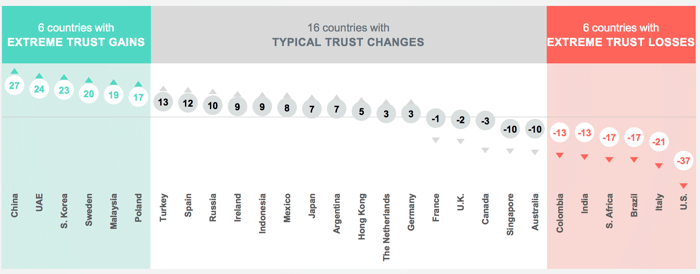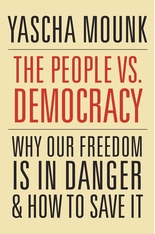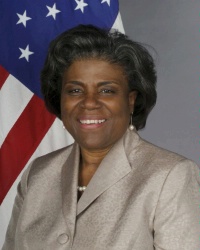
Only a third of Americans now trust their government “to do what is right”—a decline of 14 percentage points from last year, according to a new report by the communications marketing firm Edelman, The Atlantic’s Uri Friedman reports:
Forty-two percent trust the media, relative to 47 percent a year ago. Trust in business and non-governmental organizations, while somewhat higher than trust in government and the media, decreased by 10 and nine percentage points, respectively. … But whereas trust is falling in the United States and a number of other countries with tumultuous politics at the moment, including South Africa, Italy, and Brazil, it’s actually increasing elsewhere, most prominently in China.
 Eighty-four percent of Chinese respondents said they trusted government—levels the United States hasn’t seen since the early Johnson administration—and 71 percent said they trusted the media. The world’s two most powerful countries, one democratic and the other authoritarian, are moving in opposite directions.
Eighty-four percent of Chinese respondents said they trusted government—levels the United States hasn’t seen since the early Johnson administration—and 71 percent said they trusted the media. The world’s two most powerful countries, one democratic and the other authoritarian, are moving in opposite directions.
“There’s a lot of chaos and uncertainty in the world, and when there is chaos and uncertainty in the world centralized, authoritative power tends to do better,” Edelman researcher David Bersoff added.
U.S. foreign policy is showing evidence of growing Jacksonian influence, at least with respect to trade and promoting democracy, according to Walter Russell Mead.
“Jacksonians are not liberal Wilsonians. They don’t actually think that the world is headed toward a kind of a peaceful universe,” he tells POLITICO’s Susan Glasser. “And they believe in a kind of an unfettered American sovereignty as being at the core. They really tend not to believe much in democracy promotion as a national policy.”
 Exaggerating the threat of authoritarianism “makes it harder, rather than easier, to strengthen liberal democracy and guard against backsliding,” argues Daniel Nexon, an associate professor in Georgetown University’s School of Foreign Service.
Exaggerating the threat of authoritarianism “makes it harder, rather than easier, to strengthen liberal democracy and guard against backsliding,” argues Daniel Nexon, an associate professor in Georgetown University’s School of Foreign Service.
“There’s no need to invoke the specter of Stalin or Hitler. Here in the United States, we know where democratic backsliding can lead, because, in a sense, we’ve already been there,” he writes for the Washington Post:
Left wing critics of “liberal alarmism” point out, quite rightly, that the United States is, by many standards, a more consolidated democracy today than in past periods. Voter fraud may be trivial now, but it wasn’t for much of American history…..Heck, from the end of Reconstruction to the end of Jim Crow, much of the United States consisted of racial authoritarian enclaves. By the implicit standards sometimes used…., the United States wasn’t even a liberal democracy until fairly recently.
A new chairman has been elected to the board of the National Endowment for Democracy (NED), the Washington-based democracy assistance group.
 Andrew H. Card Jr., former White House chief of staff to President George W. Bush, succeeds Judy Shelton, who has been nominated to serve as U.S. director of the European Bank for Reconstruction and Development (EBRD). The Hon. David E. Skaggs is NED’s new vice chairman:
Andrew H. Card Jr., former White House chief of staff to President George W. Bush, succeeds Judy Shelton, who has been nominated to serve as U.S. director of the European Bank for Reconstruction and Development (EBRD). The Hon. David E. Skaggs is NED’s new vice chairman:
Card (right) served as the second-longest tenured White House Chief of Staff, from 2001—2006. More recently, he served as president of Franklin Pierce University from 2015—2016, executive director of the Office of the Provost and vice president for Academic Affairs at Texas A&M University from 2013—2014, and acting dean of the Bush School of Government and Public Service at Texas A&M from 2011—2013. From 1992—1993, Card served as U.S. Secretary of Transportation, and White House Deputy Chief of Staff from 1989—1992.
“America has always been a beacon of freedom in the world,” said Card. “And the National Endowment for Democracy has led the way for more than three decades, providing assistance and solidarity on behalf of the American people to so many around the world who are working to establish free societies that guarantee human and political rights for all. It’s an honor to have the opportunity to help guide this important, bipartisan institution.”
 According to NED President Carl Gershman, Card “brings a combination of experience in politics, business, education and public life that will be invaluable in steering the Endowment in the years ahead. We also extend our thanks to Judy Shelton, who has provided outstanding leadership this past year as chairman, in addition to her previous nine years of service on the NED Board.”
According to NED President Carl Gershman, Card “brings a combination of experience in politics, business, education and public life that will be invaluable in steering the Endowment in the years ahead. We also extend our thanks to Judy Shelton, who has provided outstanding leadership this past year as chairman, in addition to her previous nine years of service on the NED Board.”
Seven new members were also elected to the NED Board of Directors at its January meeting:
- Eileen Donahoe, executive director of the Global Digital Policy Incubator at Stanford University’s Center for Democracy, Development and the Rule of Law;
- Daniel Fried, distinguished fellow at the Atlantic Council’s Future Europe Initiative and Dinu Patriciu Eurasia Center;
- Mel Martínez, Former U.S. Senator (R-FL) and current chairman of the Southeast United States and Latin America at JPMorgan Chase;
 Victoria Nuland, chief executive officer at the Center for a New American Security;
Victoria Nuland, chief executive officer at the Center for a New American Security;- Dayton Ogden, global leader for CEO succession advisory services at Spencer Stuart;
- Linda Thomas-Greenfield (right), senior counselor at the Albright Stonebridge Group; and
- Richard Verma, vice chair and partner at the Asia Group.
Gershman also paid tribute to four retiring board members for their years of service. Martin Frost, Will Marshall, Steve Sestanovich, and Princeton Lyman had each served the maximum 9 years (3 terms) on the Board.
“NED is continually blessed with board members who are extremely generous with their time and expertise,” said Gershman. “We are deeply grateful for the contributions made by these four who provided outstanding guidance in helping to shape NED grant making for nearly a decade. We are particularly grateful for the leadership of Martin Frost, who served as NED’s chairman from 2009-2017.”







